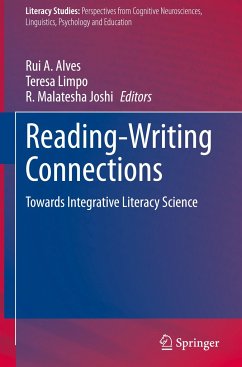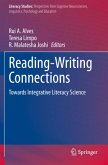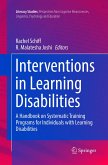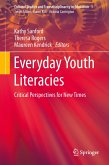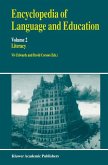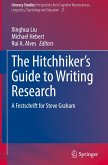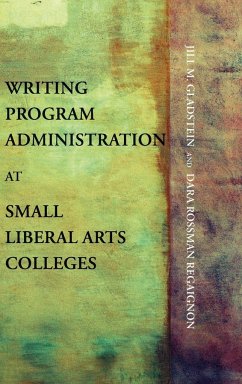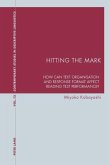Reading-Writing Connections
Towards Integrative Literacy Science
Herausgegeben:Alves, Rui A.; Limpo, Teresa; Joshi, R. Malatesha
Reading-Writing Connections
Towards Integrative Literacy Science
Herausgegeben:Alves, Rui A.; Limpo, Teresa; Joshi, R. Malatesha
- Gebundenes Buch
- Merkliste
- Auf die Merkliste
- Bewerten Bewerten
- Teilen
- Produkt teilen
- Produkterinnerung
- Produkterinnerung
This book shows that reading-writing is a two-way street that is burgeoning with research activity. It provides a comprehensive and updated view on reading-writing connections by drawing on extant research and findings. It puts forward a new conception of literacy, one that establishes reading and writing connections as the primeval ground for building literacy science. It shows how an integrative view of literacy can have deep and lasting effects on conceptualizing literacy development in several orthographies and on improving literacy instruction and remediation worldwide. The book examines…mehr
Andere Kunden interessierten sich auch für
![Reading-Writing Connections Reading-Writing Connections]() Reading-Writing Connections112,99 €
Reading-Writing Connections112,99 €![Interventions in Learning Disabilities Interventions in Learning Disabilities]() Interventions in Learning Disabilities97,99 €
Interventions in Learning Disabilities97,99 €![Everyday Youth Literacies Everyday Youth Literacies]() Everyday Youth Literacies75,99 €
Everyday Youth Literacies75,99 €![Encyclopedia of Language and Education Encyclopedia of Language and Education]() Encyclopedia of Language and Education57,99 €
Encyclopedia of Language and Education57,99 €![The Hitchhiker's Guide to Writing Research The Hitchhiker's Guide to Writing Research]() The Hitchhiker's Guide to Writing Research104,99 €
The Hitchhiker's Guide to Writing Research104,99 €![Writing Program Administration at Small Liberal Arts Colleges Writing Program Administration at Small Liberal Arts Colleges]() Jill M. GladsteinWriting Program Administration at Small Liberal Arts Colleges66,99 €
Jill M. GladsteinWriting Program Administration at Small Liberal Arts Colleges66,99 €![Hitting the Mark Hitting the Mark]() Myoko KobayashiHitting the Mark81,70 €
Myoko KobayashiHitting the Mark81,70 €-
-
-
This book shows that reading-writing is a two-way street that is burgeoning with research activity. It provides a comprehensive and updated view on reading-writing connections by drawing on extant research and findings. It puts forward a new conception of literacy, one that establishes reading and writing connections as the primeval ground for building literacy science. It shows how an integrative view of literacy can have deep and lasting effects on conceptualizing literacy development in several orthographies and on improving literacy instruction and remediation worldwide. The book examines in detail such issues as modeling approaches to reading-writing relations, literacy development, reading and spelling across orthographies and integrative approaches to literacy instruction and remediation.
Produktdetails
- Produktdetails
- Literacy Studies 19
- Verlag: Springer / Springer International Publishing / Springer, Berlin
- Artikelnr. des Verlages: 978-3-030-38810-2
- 1st edition 2020
- Seitenzahl: 336
- Erscheinungstermin: 3. Juni 2020
- Englisch
- Abmessung: 241mm x 160mm x 24mm
- Gewicht: 658g
- ISBN-13: 9783030388102
- ISBN-10: 3030388107
- Artikelnr.: 58358761
- Herstellerkennzeichnung Die Herstellerinformationen sind derzeit nicht verfügbar.
- Literacy Studies 19
- Verlag: Springer / Springer International Publishing / Springer, Berlin
- Artikelnr. des Verlages: 978-3-030-38810-2
- 1st edition 2020
- Seitenzahl: 336
- Erscheinungstermin: 3. Juni 2020
- Englisch
- Abmessung: 241mm x 160mm x 24mm
- Gewicht: 658g
- ISBN-13: 9783030388102
- ISBN-10: 3030388107
- Artikelnr.: 58358761
- Herstellerkennzeichnung Die Herstellerinformationen sind derzeit nicht verfügbar.
Rui A. Alves, PhD., is Assistant Professor of Psychology at the University of Porto. He is former coordinator of the Special Interest Group on Writing of the European Association for Research on Learning and Instruction. He is Associate Editor of the journals Reading & Writing and Culture & Education. Currently, he leads the European Literacy Network, ELN. Teresa Limpo is Assistant Professor at the Faculty of Psychology and Education Sciences of the University of Porto. She conducts research on the cognitive and motivational processes in writing and develops evidence-based writing interventions to promote writing skills in school-aged children. Regularly, she creates and implements professional development courses to train teachers in using these practices. R. Malatesha Joshi, Ph.D., is Professor of Reading/Language Arts Education and Educational Psychology at Texas A&M University and a fellow of the American Educational Research Association. He is the Editorof the Reading and Writing: An Interdisciplinary Journal as well as the Series Editor of Springer's Literacy Studies: Perspectives from Cognitive Neurosciences, Linguistics, Psychology, and Education.
Foreword by Timothy Shanahan.- Introduction to Reading-Writing Connections: The Integration Roads Ahead; R. A. Alves, T. Limp and R. M. Joshi.- Part I: Modeling Approaches to Reading-Writing Relations.- Interactive Dynamic Literacy Model: An Integrative Theoretical Framework for Reading-Writing Relations; Young-Suk Grace Kim.- An Analysis and Comparison of Three Theoretical Models of the Reading-Writing Relationships in Spanish-Speaking Children; Juan E. Jiménez, Eduardo García, Francisco Naranjo, & Juan A. Hernández.- Modeling the Complexities in Reading and Writing Development; Yusra Ahmed and Richard K. Wagner,.- Modeling Relations Between Reading and Writing; Richard K. Wagner.- Part II: Literacy development.- Orality, Reading and Writing in Early Literacy; Ana Teberosky, Angélica Sepúlveda, and Otília Costa e Sousa.- Writing like a reader: Developing metalinguistic understanding to support reading-writing connections; Debra Myhill, Helen Lines and Susan Jones.-The Relative Contribution Of Cognitive, Linguistic And Reading Abilities To The Writing Quality Of Expository Text Structure In Young Hebrew Speaking School Children; Anat Stavans, Sara Zadunaisky-Ehrlich, and Batia Seroussi.-(Re)Constructing Voices: Immigrant Women Read and Write for Social Justice and Themselves; Robin L. Danzak.- Text Writing at the Core of Literacy Discourse; Liliana Tolchinsky.- Part III: Reading and spelling across orthographies.- The Role of Distal and Proximal Cognitive Processes in Literacy Skills in Greek; Timothy C. Papadopoulos,George K. Georgiou and Theodosia Apostolou.- Reading and Spelling Skills in Transparent Orthographies: Phonological awareness and Rapid Automatized Naming in Turkish; Ecehan Sönmez, Nalan Babür, Belma Haznedar and Gülcan Erçetin, Bogaziçi.- The Development of Reading and Spelling in Polish: A Semi-transparent Orthography; Izabela Pietras and Marta Lockiewicz.- Research of Reading and Writing in Lithuania: Past, Present andFuture; Reda Gedutiene.- A Mature Science of Reading and Spelling; Barbara Arfé.- Part IV: Integrative approaches to literacy instruction and remediation.- The Reading-Writing Connection in Assessment of Reading Comprehension: Exploring the Role of a Communicative Aspect of Writing; Per Henning Uppstad, Oddny Judith Solheim and Atle Skaftun.- Mothers Teaching their Children the Hebrew Writing System: Children's Early Writing and Reading Skills; Adi Elimelech, Dorit Aram and Iris Levin.- Decoding and Self-Assessment Intervention with Persistently Struggling Readers: Impacts on Reading, Self-Efficacy and Transfer on Spelling; Marie Van Reybroeck, Egidia Cumbo and Claire Gosse.- Reading and Writing Connections: A Commentary; Steve Graham.
Foreword by Timothy Shanahan.- Introduction to Reading-Writing Connections: The Integration Roads Ahead; R. A. Alves, T. Limp and R. M. Joshi.- Part I: Modeling Approaches to Reading-Writing Relations.- Interactive Dynamic Literacy Model: An Integrative Theoretical Framework for Reading-Writing Relations; Young-Suk Grace Kim.- An Analysis and Comparison of Three Theoretical Models of the Reading-Writing Relationships in Spanish-Speaking Children; Juan E. Jiménez, Eduardo García, Francisco Naranjo, & Juan A. Hernández.- Modeling the Complexities in Reading and Writing Development; Yusra Ahmed and Richard K. Wagner,.- Modeling Relations Between Reading and Writing; Richard K. Wagner.- Part II: Literacy development.- Orality, Reading and Writing in Early Literacy; Ana Teberosky, Angélica Sepúlveda, and Otília Costa e Sousa.- Writing like a reader: Developing metalinguistic understanding to support reading-writing connections; Debra Myhill, Helen Lines and Susan Jones.-The Relative Contribution Of Cognitive, Linguistic And Reading Abilities To The Writing Quality Of Expository Text Structure In Young Hebrew Speaking School Children; Anat Stavans, Sara Zadunaisky-Ehrlich, and Batia Seroussi.-(Re)Constructing Voices: Immigrant Women Read and Write for Social Justice and Themselves; Robin L. Danzak.- Text Writing at the Core of Literacy Discourse; Liliana Tolchinsky.- Part III: Reading and spelling across orthographies.- The Role of Distal and Proximal Cognitive Processes in Literacy Skills in Greek; Timothy C. Papadopoulos,George K. Georgiou and Theodosia Apostolou.- Reading and Spelling Skills in Transparent Orthographies: Phonological awareness and Rapid Automatized Naming in Turkish; Ecehan Sönmez, Nalan Babür, Belma Haznedar and Gülcan Erçetin, Bogaziçi.- The Development of Reading and Spelling in Polish: A Semi-transparent Orthography; Izabela Pietras and Marta Lockiewicz.- Research of Reading and Writing in Lithuania: Past, Present andFuture; Reda Gedutiene.- A Mature Science of Reading and Spelling; Barbara Arfé.- Part IV: Integrative approaches to literacy instruction and remediation.- The Reading-Writing Connection in Assessment of Reading Comprehension: Exploring the Role of a Communicative Aspect of Writing; Per Henning Uppstad, Oddny Judith Solheim and Atle Skaftun.- Mothers Teaching their Children the Hebrew Writing System: Children's Early Writing and Reading Skills; Adi Elimelech, Dorit Aram and Iris Levin.- Decoding and Self-Assessment Intervention with Persistently Struggling Readers: Impacts on Reading, Self-Efficacy and Transfer on Spelling; Marie Van Reybroeck, Egidia Cumbo and Claire Gosse.- Reading and Writing Connections: A Commentary; Steve Graham.

